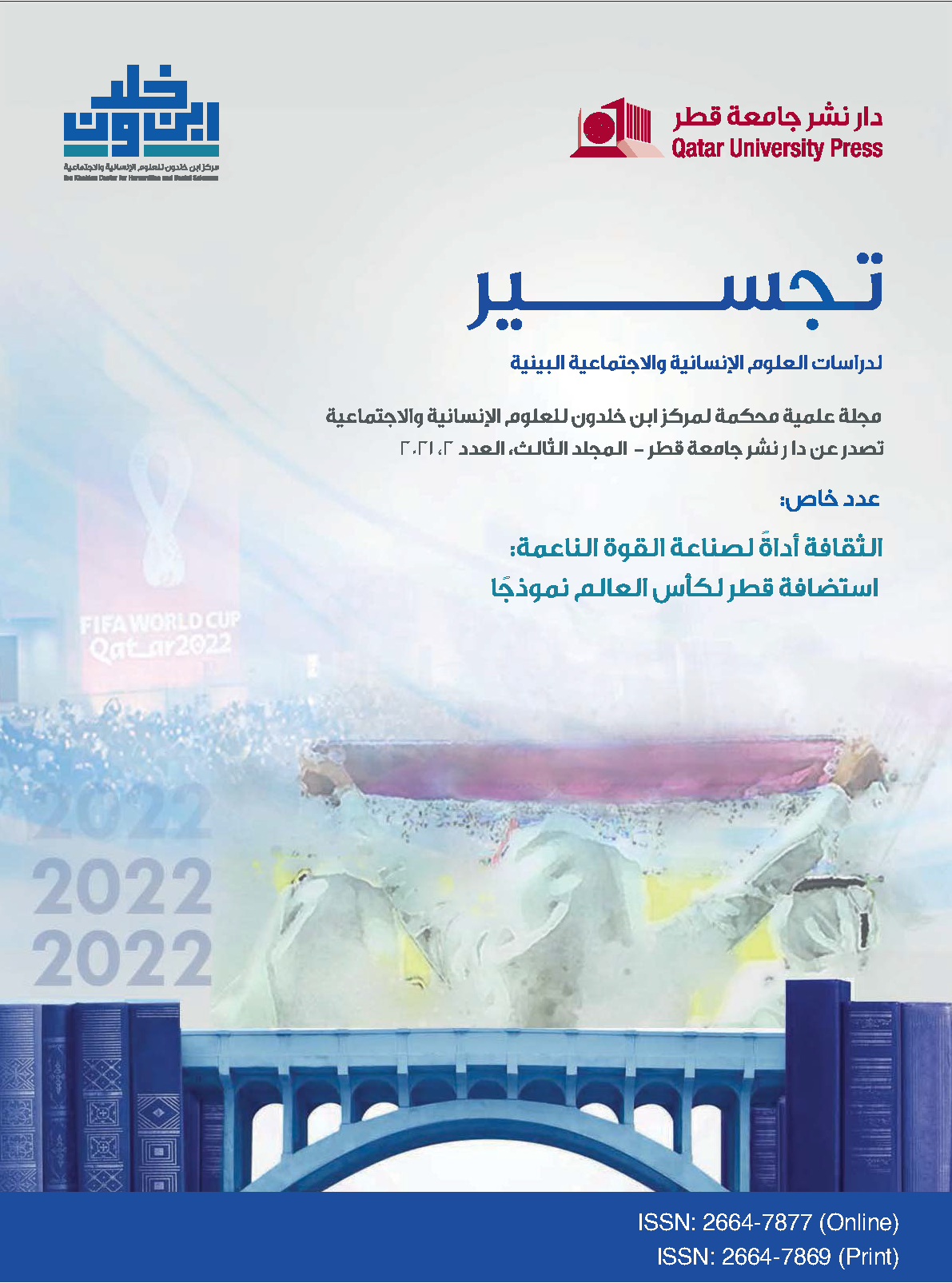الرياضة والعلاقات الدولية: القوة الناعمة القطرية وصناعة السياسة الخارجية
الملخص
تلعب الرياضة دورًا مُهمًّا في السياسة والعلاقات الدولية، لكن العلاقة بين القوة الناعمة واستضافة الفعاليات الرياضية الضخمة مثل الألعاب الأولمبية وكأس العالم غير واضحة. تتقيد غالبية الأدبيات المتوفرة حول دور الرياضة في القوة الناعمة القطرية بالمدرسة الواقعية لنظرية العلاقات الدولية، وتميل إلى تأكيد حجم الدولة في فهم دوافع البلد للانخراط في الدبلوماسية الرياضية. تحاول هذه الورقة تجاوز هذا الطرح باعتمادها على مقاربة ما بعد بنيوية تأويلية ونظرية الخطاب، تأخذ بالاعتبار التباينات في الكيفية التي تستخدم بها الدبلوماسية الرياضية في سياقات ثقافية مختلفة. ومن خلال اعتبار أن قطر تمثل تاريخًا وتقليدا ثقافيا متميزا، تشكل ضمنه الرياضة هوية سياسية للدولة، تنظر هذه الورقة في الكيفية التي تمارس بها دولة قطر القوة الناعمة من خلال الدبلوماسية الرياضية واستضافة الفعاليات الرياضية الكبرى. تحلل الورقة الخطابات الرسمية المرافقة لاستضافة قطر لكأس العالم فيفا 2022، وتناقش كيف أن استخدام الدبلوماسية الرياضية ساهم في تحقيق العديد من الأهداف الدبلوماسية الخارجية للدولة.
المقاييس
##plugins.themes.bootstrap3.article.details##
السياسة الخارجيةالعلاقات الدوليةالرياضةالقوة الناعمةالخطابالسياسات
Almaskati, Bader, “Qatar's Nation Branding Strategies: The Effectiveness of Soft Power.” (Master’s thesis, SOAS, 2014).
Arnaud, Pierre, and Jim Riordan, eds. Sport and international politics: Impact of Fascism and Communism on Sport. Routledge, 2013.
Bairner, Alan, John Kelly, and Jung Woo Lee, eds. Routledge handbook of sport and politics. Taylor & Francis, 2016.
Bale, John, and Mike Cronin, eds. Sport and postcolonialism. (Abingdon: Routledge, 2020).
Cerwyn Moore and Chris Farrand, International Relations Theory and Philosophy, (USA and Canada: Routledge, 2010).
Cornelissen, Scarlett. “The geopolitics of global aspiration: Sport mega-events and emerging powers.” The International Journal of the History of Sport 27, no. 16-18 (2010).
Fan Hong (ed.), Sport in the Middle East: Power, Politics, Ideology and Religion, 1-16. Abingdon: Routledge, 2017.
Griffin, Thomas Ross, "Football in the Hands of the Other: Qatar’s World Cup in the British Broadsheet Press’." Arab World Geographer 20, no. 2–3 (2017).
Griffin, Thomas Ross, "National identity, social legacy and Qatar 2022: the cultural ramifications of FIFA’s first Arab World Cup." Soccer & Society 20, no. 7-8 (2019).
Grix, Jonathan et al., Entering the Global Arena, 97-110. Palgrave Pivot, Singapore, 2019.
Grix, Jonathan, and Donna Lee, "Soft power, sports mega-events and emerging states: The lure of the politics of attraction." Global society 27, no. 4 (2013).
Grix, Jonathan, and Paul Michael Brannagan, “Of Mechanisms and Myths: Conceptualising States’ ‘Soft Power’ Strategies through Sports Mega-Events.” Diplomacy & Statecraft 27, no. 2 (2016):
Grix, Jonathan, Brannagan, P. M., & Houlihan, B., ‘Interrogating States’ Soft Power Strategies: A Case Study of Sports Mega-Events in Brazil and the UK;. Global Society, 29, no. 3. (2015).
Grix, Jonathan, Brannagan, Paul Michael, and Lee, Donna, “Qatar’s Global Sports Strategy: Soft Power and the 2022 World Cup.” Entering the Global Arena, 2019, 97–110.
Grix, Jonathan, Paul Michael Brannagan, and Barrie Houlihan, “Interrogating States’ Soft Power Strategies: A Case Study of Sports Mega-Events in Brazil and the UK.” Global Society 29, no. 3 (2015)
Gruneau, Richard S., Sport and Modernity. Cambridge: John Wiley & Sons, 2018.
Hansen, Lene. "A case for seduction? Evaluating the poststructuralist conceptualization of security." Cooperation and Conflict 32, no. 4 (1997).
Hayden, Craig, The Rhetoric of Soft Power: Public diplomacy in global contexts, Lexington Books, 2012.
Hong, Fan, (ed.) Sport in the Middle East: Power, Politics, Ideology and Religion. Routledge, 2017.
Houlihan, Barrie, Zheng, Jinming, “Small States: Sport and Politics at the Margin,” International Journal of Sport Policy and Politics 7, no. 3 (2015).
Howarth, David J., Discourse, Open University Press, 2010.
John Bale and Mike Cronin (eds.), Sport and Post-colonialism, Abingdon: Routledge, 2020.
Khalidi, Rashid. The Origins of Arab Nationalism. New York: Columbia University Press, 1991.
Koch, Natalie, "The Geopolitics of Gulf Sport Sponsorship." Sport, Ethics and Philosophy 14, no. 3 (2020).
Mattern, Janice Bially, "Why ‘soft power' isn't so soft: representational force and the sociolinguistic construction of attraction in world politics." Millennium 33, no. 3 (2005).
Murray, Bill. Football: A history of the world game. Routledge, 1994.
Murray, Stuart. “Sports Diplomacy in the Australian Context: Theory into Strategy.” Politics & Policy 45, no. 5 (2017).
Norval, David R. Howarth Aletta J., Yannis Stavrakakis, and Avril Ehrlich. Discourse theory and political analysis: Identities, hegemonies and social change. Manchester University Press, 2000.
Nye, Joseph S. “Soft Power.” Foreign Policy, no. 80 (1990).
____. The future of power. Public Affairs, 2011.
Sayin, Yusef, Ates, Davut, “Poststructuralism and the analysis of international relations”. Alternatives: Turkish Journal of International Relations, 11, no. 2, (2012).
Scott R. Jedlicka, ‘Appropriated authority: a theory of transnational sport governance’, International Journal of Sport Policy and Politics, 10:4, (2018).
Simpanen, Teppo-Tuomas, “Soft Power and the Social Construction of Collective Identity. Why Does the European Union Fail to Attract the British Public?” (BA Thesis, Malmö University, 2018).
Trunkos, Judit, Heere. Bob, "Sport diplomacy: A review of how sports can be used to improve international relationships." Case studies in sport diplomacy (2017).
Wang, Jian, ed. Soft power in China: Public diplomacy through communication. Springer, 2011.
Wolfe, Sven Daniel, “‘For the benefit of our nation’: unstable soft power in the 2018 men’s World Cup in Russia”, International Journal of Sport Policy and Politics, 12:4, (2020).
********************************************************************************************


